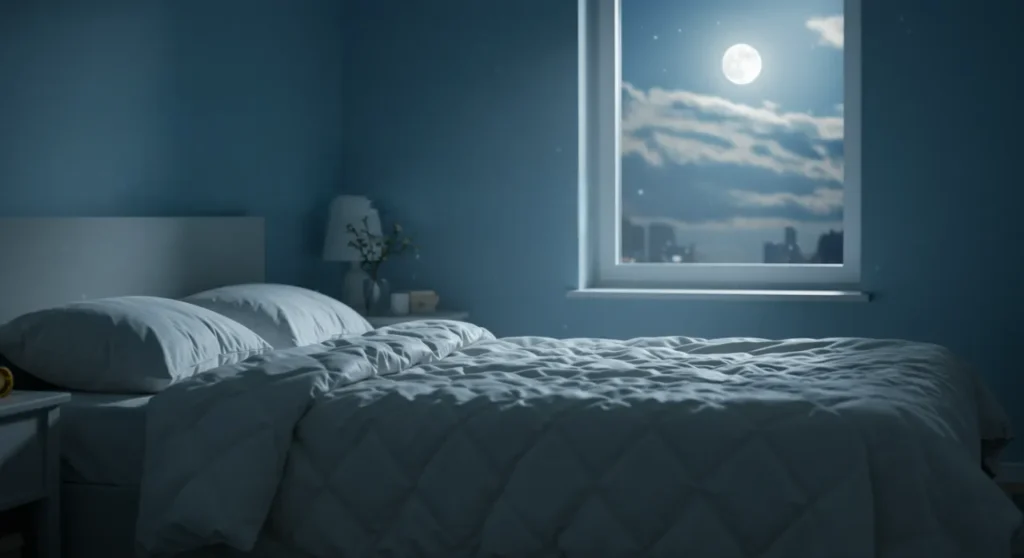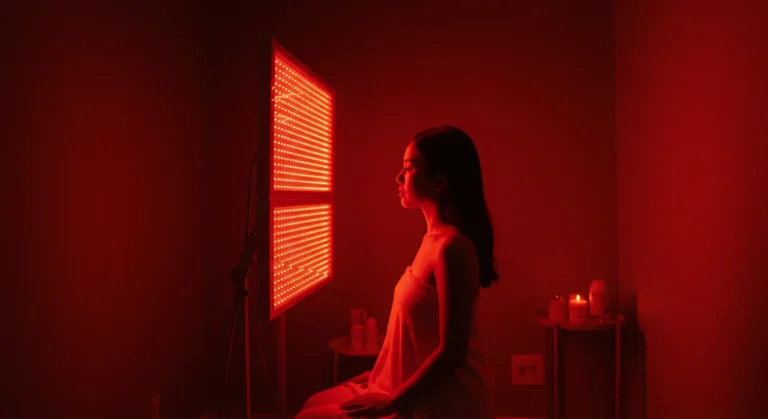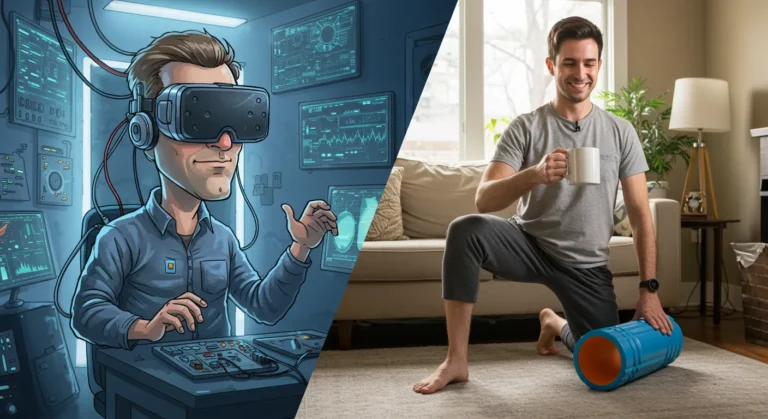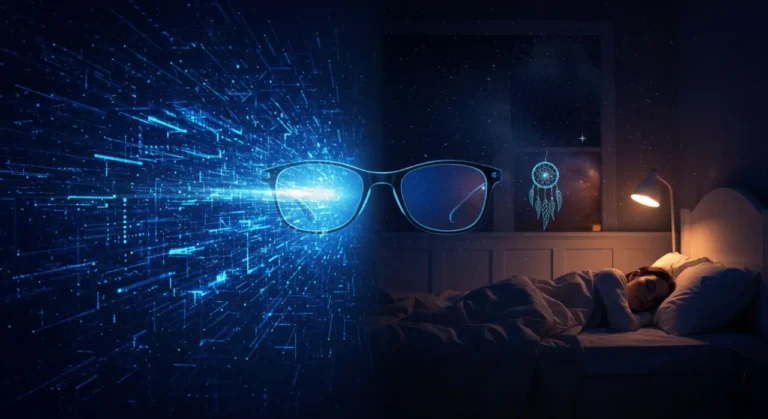Best Sleep Tracker: I Thought I Slept Great Until I Started Tracking (Revealed Everything)

For years, I was convinced I had sleep figured out. Eight hours in bed, consistent bedtime, blackout curtains—I checked all the boxes. So why did I still wake up feeling like I’d been hit by a truck?
The answer came from an unexpected source: a small device on my wrist that completely changed how I understand rest.
Last spring, Federico suggested we both start using sleep trackers. “It’s not about sleeping more,” he said. “It’s about sleeping smarter.” I was skeptical. How much could a gadget really tell me about something as basic as sleep?
Three months later, I discovered I was getting less than an hour of deep sleep per night. My “perfect” eight hours were mostly light, restless cycles. No wonder I felt exhausted.
If you’re tired of feeling tired despite doing everything “right,” finding the best sleep tracker might reveal what’s really happening during those crucial nighttime hours.
Why Your Sleep Isn’t As Good As You Think
Here’s what most people don’t realize: time in bed doesn’t equal quality sleep.
You might spend eight hours horizontal, but if you’re cycling through light sleep all night with minimal deep or REM phases, your body isn’t getting the restoration it needs. It’s like eating 2,000 calories of junk food and wondering why you feel undernourished.
The research is clear on this. Studies from the National Sleep Foundation show that sleep quality matters more than quantity for cognitive function, emotional regulation, and physical recovery. Yet most of us have no idea what our actual sleep architecture looks like.
That’s where a sleep tracking device becomes invaluable. Instead of guessing based on how you feel (which can be influenced by everything from caffeine to stress), you get objective data about what’s actually happening while you’re unconscious.
The Best Sleep Tracker That Actually Deliver Insights
After testing various devices over the past year, here are the wearable sleep trackers that provide genuinely useful information:
Oura Ring Gen3 – The Invisible Game Changer
Smart ring with comprehensive sleep analysis
This tiny ring changed how I approach sleep entirely. It tracks everything—sleep stages, heart rate variability, body temperature fluctuations—without the bulk of a watch.
What makes it special? The temperature sensing. It can detect when you’re getting sick before you feel symptoms, all based on subtle body temperature changes during sleep. The battery lasts nearly a week, so you’re not constantly charging it.
Reality check: No screen means you rely entirely on the app for data. Some people love this distraction-free approach; others miss the convenience of wrist-based info.
Fitbit Charge 6 – The Reliable Workhorse
Fitness tracker with robust sleep monitoring
This sleep tracker watch has become my go-to recommendation for people new to sleep tracking. It provides clear, actionable insights without overwhelming you with data.
The sleep score feature is particularly helpful—it translates complex sleep data into a simple number you can understand and improve. The smart alarm wakes you during lighter sleep phases, which honestly makes a noticeable difference in how alert you feel.
Consider this: It’s bulkier than a ring, which some side sleepers find uncomfortable initially.
Apple Watch Series 9 – The Ecosystem Champion
Comprehensive health tracking with sleep insights
If you’re already in the Apple ecosystem, this sleep tracking watch integrates seamlessly with your existing health data. The sleep tracking has improved dramatically in recent generations.
What I appreciate most is how it connects sleep data with other metrics. You can see how your sleep affects your stress levels, workout recovery, and even your mood patterns throughout the day.
The trade-off: Battery life means daily charging, which can be inconvenient if you want to track sleep every night.
Whoop 4.0 – The Data Obsessive’s Dream
Subscription-based comprehensive recovery tracking
This isn’t just a sleep monitor—it’s a complete recovery optimization system. The insights go beyond basic sleep stages to analyze strain, recovery, and how your sleep impacts your readiness for the next day.
Federico swears by the personalized coaching recommendations. The device learns your patterns and suggests optimal bedtimes, wake times, and recovery strategies based on your individual data.
Important note: The monthly subscription model means ongoing costs, but if you’re serious about optimization, the depth of insights justifies the expense.
Amazfit Band 7 – The Budget Champion
Affordable sleep tracking with essential features
Sometimes you don’t need all the bells and whistles. This sleep watch covers the basics—sleep stages, duration, consistency—at a fraction of the cost of premium options.
The 18-day battery life is remarkable. You can wear it for weeks without thinking about charging, which removes a major barrier to consistent tracking.
Keep in mind: The app experience isn’t as polished as premium alternatives, but for basic sleep insights, it delivers solid value.
What Three Months of Sleep Tracking Taught Me
My “perfect” bedtime routine wasn’t perfect. Turns out, reading on my phone (even with blue light filters) still impacted my sleep quality. The data made it obvious in ways that my subjective experience didn’t.
Room temperature matters more than I thought. My Oura Ring showed that even small temperature increases (2-3 degrees) significantly reduced my deep sleep. Simple fix, major impact.
Consistency beats perfection. My best sleep scores came from maintaining the same bedtime and wake time, even on weekends. The data reinforced what sleep researchers have been saying for years.
Stress shows up immediately. During particularly challenging weeks, my sleep architecture changed dramatically—less deep sleep, more wake-ups—even when I thought I was managing stress well.
Small changes compound. A 15-minute meditation before bed, avoiding screens after 9 PM, keeping the room at 67°F—individually minor adjustments that created measurable improvements in my sleep quality.
Choosing Your Best Sleep Tracker: What Actually Matters
Start with your goals. Are you trying to improve energy, optimize recovery, or satisfy curiosity about your sleep patterns?
For general wellness and energy improvement, the Fitbit Charge 6 offers the best balance of insights and usability.
If you want comprehensive data without the bulk of a watch, the Oura Ring provides exceptional tracking in a minimal form factor.
Consider your lifestyle. Do you want something you can forget you’re wearing, or do you appreciate having information at a glance?
Think about integration. Choose a device that works well with your existing apps and phone ecosystem.
Don’t get overwhelmed by features. More data isn’t always better. Pick a tracker that provides actionable insights you’ll actually use.
The Real Question: Does Sleep Tracking Actually Help?
After nearly a year of consistent tracking, I can honestly say yes—but with important caveats.
The value isn’t in the data itself; it’s in how the data changes your behavior. Seeing that late-night wine reduces your deep sleep by 40% is more motivating than any article about alcohol and sleep quality.
But tracking without action is just expensive self-surveillance. The insights only matter if you use them to make changes.
The most valuable aspect has been understanding my personal patterns. Generic sleep advice doesn’t account for individual differences. What works for my friend might not work for me—and vice versa.
Your Next Step
If you’re curious about why you’re not waking up refreshed despite adequate sleep time, a best sleep tracker can provide insights you can’t get anywhere else.
Whether you choose a comprehensive sleep tracking device like the Oura Ring or a budget-friendly option like the Amazfit Band, the key is consistent use and willingness to act on what you discover.
The devices mentioned above represent the best options we’ve found after extensive testing. Choose based on your budget, comfort preferences, and how much data you actually want to process.
Ready to understand your sleep better? Check out our complete guides to sleep optimization—it covers everything from environment setup to pre-sleep routines, all informed by real tracking data instead of generic advice.
Disclaimer: The information provided is for educational purposes only, not a substitute for professional medical advice. Always consult a healthcare professional.





